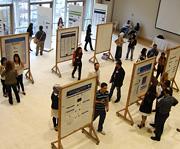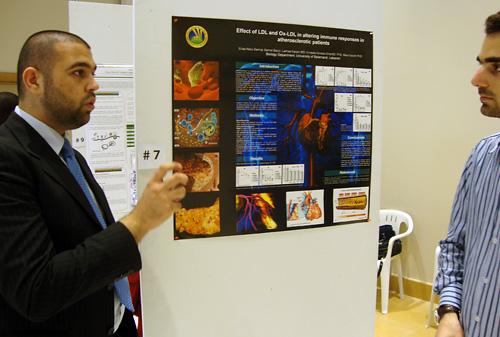Graduate biology students compete for poster prize
Graduate students presented research on topics ranging from genetics to physiology and immunology at the fourth annual Poster Conference in Biology and Biomedical Sciences, held at the Frem Civic Center, Byblos campus, on May 4.
Organized by the Natural Sciences Department at LAU Byblos, the conference brought 50 graduate students from biology and biomedical sciences programs from universities around Lebanon to compete for the top poster prize.
The main objectives, according to the event’s organizers, were to train graduate students on how to present their research work on scientific posters, as a stepping stone for future participation in international scientific meetings and conferences; foster national research collaboration and interactive exchange; and build a scientific community of young researchers.
Dr. Fuad Hashwa, dean of the School of Arts and Sciences at LAU Byblos, calls the event “unique for Lebanon.”
“LAU is the only university that organizes such annual poster conferences for graduate students in molecular biology,” Hashwa says. “This has been recognized by sister universities, such as

the American University of Beirut, University of Balamand, Université Saint-Joseph, Haigazian University and American University of Science and Technology, and their participation this year was very significant,” he adds.
While an observer unfamiliar with the highly scientific language of molecular biology may not have understood the posters’ contents, the students’ enthusiasm for their research was palpable as they explained their projects to judges, visitors and faculty during presentations.
“I was truly impressed with the level of science that was presented from the participating universities,” says Dr. Brigitte Wex, assistant professor in the Natural Sciences Department at LAU Byblos and one of the competition’s judges.
“Even more mesmerizing for me, as a judge, was to be able to witness the excitement of students in representing their own research projects while striving to win first prize in the competition,” says Wex.
Natalia El-Merhie is pursuing a master’s in biology at Beirut Arab University and entered the poster conference after hearing about it from her supervisor.
“I think this event is very informative and it’s a great way to bring us all together to showcase our research,” she says. Her research and poster project, tackling the effect of calcium on glucose levels and body weight gain using immature rats, took her five weeks to complete.
It was the second poster conference for Rola Timani, a graduate student in molecular biology at LAU Byblos, who hopes to pursue a career in public health or cancer research.
Explaining her poster topic, Timani said: “I wanted to focus on pathogenic hospital-acquired diseases and study the resistance of these bacteria to antibiotics. I utilized molecular typing at the DNA level to differentiate between strains.”
In addition to Wex, Dr. Zuhair Attieh from AUST and Dr. Marc Karam fromUoB judged the posters. They were sent copies of the students’ abstracts a few days before the competition and then assessed the posters during the conference for a final combination score, according to Maya Farah, senior science lab technician at LAU’s Molecular Biology Lab, Byblos campus, who was the head organizer of the poster conference.
The first prize of LL500,000 (courtesy of the Lebanese Association for the Advancement of Science) went to Elias Abou Samra from UoB. The second prize of LL250,000 went to Samer Hanna from LAU, and the third prize of LL150,000 went to Rasha Mismar from AUST.
Three companies that the Molecular Biology Lab receives lab materials from — Numelab, Basilky and IV-lab — also made contributions toward the prize money and all event expenses.
First convened in 2008 under the tutelage of Wex, the poster conference has grown every year since with the help of Dr. Costantine Daher, associate professor of biology and chair of the Department of Natural Sciences at LAU Byblos, and Farah.
This year’s competition was combined with the international conference on research trends in food safety, which helped boost participation and attendance, according to Farah. She adds that some of the food safety conference speakers and participants came to the poster conference and also attended a joint introductory microscopy workshop.
The poster conference also featured seminars given during three sessions throughout the day. The speakers — faculty and researchers including LAUM.D. students and alumni — focused on recent advances, discoveries and techniques in fields related to the poster competition’s themes.
The first session mostly concentrated on biotechnology in vaccines, stem cell and cancer therapies; the second session focused on cancer and genetics research; and the third session on microbiology, ending with microscopy applications.